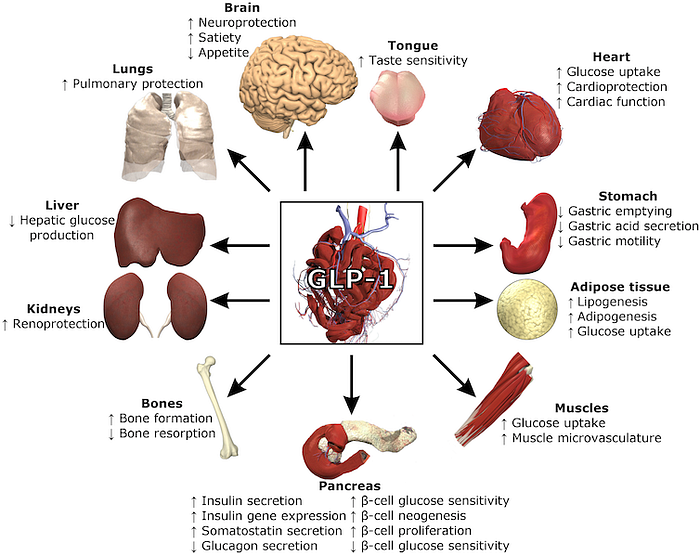Associate Professor of Gastroenterology at the University of WashingtonChrisChristopher Damman

Wegovy, Ozempic, and Mounjaro have made a significant impact in health news regarding weight loss and diabetes medications. They target the regulatory pathways involved in obesity and diabetes and are widely regarded as breakthroughs for weight loss and blood sugar control.
However, do these medications address the root causes of metabolic diseases? What inspired their development?
It turns out that your body produces natural versions of these medications in your gut (also known as gut hormones). Nutrients in food help regulate these hormones, which may not be surprising. However, it may surprise you that the trillions of microbes in your gut are key players in orchestrating this process.
I am a gastroenterologist at the University of Washington studying how food and the gut microbiome affect health and disease. This is an inside-out perspective on the role of natural gut hormones and healthy foods in metabolism and weight loss.
Gut Breakdown
Specialized bacteria in the lower gut break down indigestible components of food, such as fiber and polyphenols, which are elements of plants removed in many processed foods, and convert them into molecules that stimulate hormones to control appetite and metabolism. This includes GLP-1, the natural version of Wegovy and Ozempic.
GLP-1 and other hormones, such as PYY, help regulate blood sugar through the pancreas. They also signal your brain that you have enough food, and your stomach and intestines can slow the movement of food through the digestive tract to allow for digestion. This system even has a name: colonic brake.

Before modern processed foods, metabolic regulatory pathways were guided by a diverse and healthy gut microbiome, which naturally used these hormones to regulate your metabolism and appetite. However, food processing aimed at improving shelf stability and enhancing flavor can remove bioactive molecules that help regulate this system, such as fiber and polyphenols.
The removal of these key food components, along with the reduction of gut microbiome diversity, may be significant factors contributing to the increase in obesity and diabetes.
Short Tracks to Metabolic Health
Wegovy and Ozempic rejuvenate the colonic brake downstream of food and microbes, with molecules similar to GLP-1. Researchers have demonstrated their effectiveness in weight loss and blood sugar control.
Mounjaro takes it a step further by combining GLP-1 with a second hormone analog derived from the upper intestine, and studies show that this combination therapy promotes weight loss more effectively than Wegovy and GLP-1 alone.
These medications complement other measures used in the most extreme cases of metabolic disease, such as gastric bypass surgery. These surgeries may work like Wegovy and Ozempic by bypassing the digestive process in the gastrointestinal tract and bathing your gut microbiome in less digested food. This awakens the microbes to stimulate gut cells to produce GLP-1 and PYY, effectively regulating appetite and metabolism.
Many patients not only see significant improvements in weight and blood sugar but also reductions in important cardiovascular outcomes such as strokes and heart attacks. Medical guidelines support the use of new gut hormone-based medications, such as Wegovy, Ozempic, and Mounjaro, to manage the interconnected metabolic conditions of diabetes, obesity, and cardiovascular disease.
Considering the effects of these medications on the brain and cravings, medical researchers are also evaluating their potential to treat non-metabolic diseases such as alcoholism, drug addiction, and depression.
Near-Magic Bullets - Suitable for the Right People
While the success and prospects of these medications may help populations that could benefit the most, current prescribing practices raise some questions. Should these medications only be used by those who are overweight? What are the risks of prescribing these medications to children and adolescents for long-term weight management?

Although gut hormone-based therapies seem like near-magic bullets, they are not without gastrointestinal side effects, such as nausea, vomiting, diarrhea, and constipation. These symptoms relate to how the medications reduce gastrointestinal function. Other more serious but rare side effects include pancreatitis and irreversible gastroparesis, or inflammation of the pancreas and stomach paralysis.
These medications may also lead to loss of healthy lean muscle mass in addition to fat, especially in the absence of exercise. Stopping the medications can lead to significant weight gain, raising further questions about long-term effects and whether a transition to managing weight solely through lifestyle measures is possible.
All Roads Lead to Lifestyle
Despite our greatest desire for quick fixes, healthy lifestyles are likely still the most important approach to managing metabolic diseases and overall health. This includes regular exercise, stress management, sleep, outdoor activities, and a balanced diet.
For most people who do not yet have obesity or diabetes, reintroducing whole foods and awakening the gut microbiome to restart the gut's built-in appetite and metabolic control may be the best way to promote healthy metabolism.
Adding minimally processed foods to your diet, especially those rich in fiber and polyphenols such as flavonoids and carotenoids, can play an important and complementary role at their deepest roots in addressing the epidemic of obesity and metabolic diseases.
This article is from The Conversation, an independent nonprofit news organization dedicated to providing you with the context to understand what is happening in the world.Learn more about them or subscribe to their weekly newsletter.
Christopher Damman is a scientific advisor on biology and superfoods.
